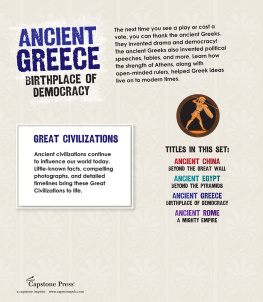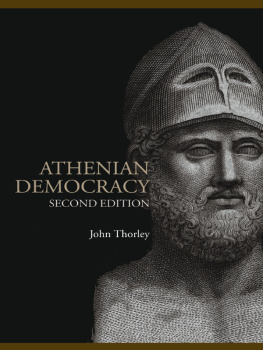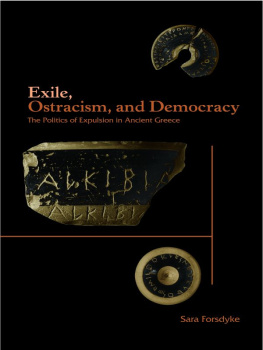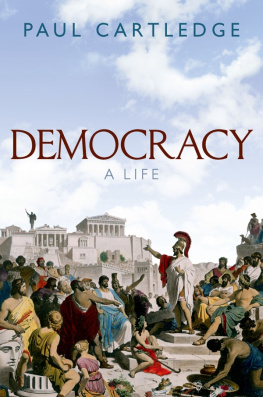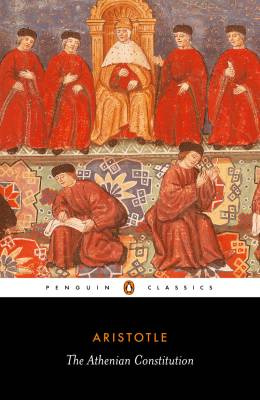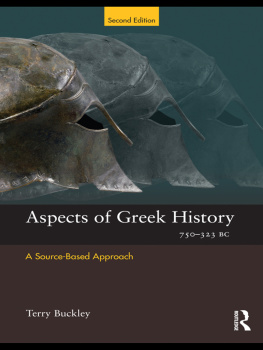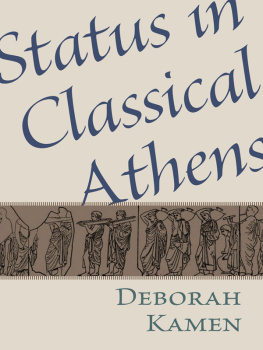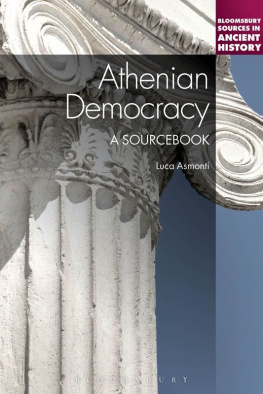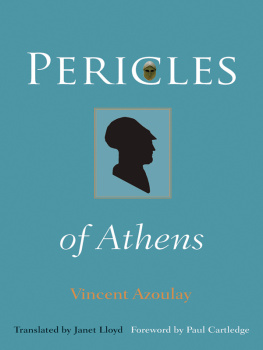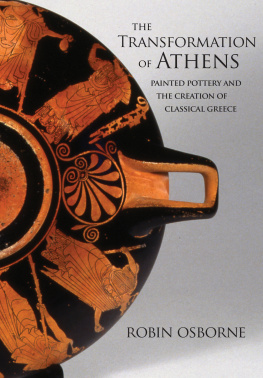OXFORD CLASSICAL MONOGRAPHS
Published under the supervision of a Committee of the Faculty of Classics in the University of Oxford
The aim of the Oxford Classical Monograph series (which replaces the Oxford Classical and Philosophical Monographs) is to publish books based on the best theses on Greek and Latin literature, ancient history, and ancient philosophy examined by the Faculty Board of Classics.

Relief on the honorific decree of the Spartocid Kings (IG II2 212 = GHI II 64).
Feeding the Democracy
The Athenian Grain Supply in the
Fifth and Fourth Centuries BC
ALFONSO MORENO


Great Clarendon Street, Oxford OX2 6DP
Oxford University Press is a department of the University of Oxford.
It furthers the Universitys objective of excellence in research, scholarship,
and education by publishing worldwide in
Oxford New York
Auckland Cape Town Dar es Salaam Hong Kong Karachi
Kuala Lumpur Madrid Melbourne Mexico City Nairobi
New Delhi Shanghai Taipei Toronto
With offices in
Argentina Austria Brazil Chile Czech Republic France Greece
Guatemala Hungary Italy Japan Poland Portugal Singapore
South Korea Switzerland Thailand Turkey Ukraine Vietnam
Oxford is a registered trade mark of Oxford University Press
in the UK and in certain other countries
Published in the United States
by Oxford University Press Inc., New York
Alfonso Moreno 2007
The moral rights of the author have been asserted
Database right Oxford University Press (maker)
First published 2007
All rights reserved. No part of this publication may be reproduced,
stored in a retrieval system, or transmitted, in any form or by any means,
without the prior permission in writing of Oxford University Press,
or as expressly permitted by law, or under terms agreed with the appropriate
reprographics rights organization. Enquiries concerning reproduction
outside the scope of the above should be sent to the Rights Department,
Oxford University Press, at the address above
You must not circulate this book in any other binding or cover
and you must impose the same condition on any acquirer
British Library Cataloguing in Publication Data
Data available
Library of Congress Cataloging in Publication Data
Data available
Typeset by SPI Publisher Services, Pondicherry, India
Printed in Great Britain
on acid-free paper by
Biddles Ltd., Kings Lynn, Norfolk
ISBN 9780199228409
1 3 5 7 9 10 8 6 4 2
For EB and OM

Preface
Trade is the linchpin of any coherent concept of the Classical or Mediterranean world. For such coherence depends on processes that can only exist through trade: a live diffusion of ideas through space and time; a constant intellectual and material interaction; a vast movement of countless persons and objects across enormous distances. Most traders, the principal agents of this phenomenon, of course remain nameless to us, their concerns appear utterly mundane, and their activities hide in the background of more dramatic events. Only in hindsight will their power appear historically fundamental. Political structures, imposed over periods and regions through varieties of government, diplomacy, or military action, are amazingly ephemeral in comparison with the structures created by trade.
This work presents a history of the Classical Athenian grain supply, a single and relatively well-documented example of trade in the ancient Mediterranean. Influential recent publications on this subject have argued that Athens was nearly self-sufficient in grain from its own countryside during the fifth and fourth centuries BC, and did not require constant and large-scale importations from overseas sources, as traditionally thought. The almost immediate transformation of this new model into orthodoxy would be surprising if it did not cohere so solidly with other long-established scholarly beliefs, especially in the socially marginalized status of the Greek trader. Indeed, before the creation of the new model, it was an awkward paradox to think of any trade as being socially, politically, or economically important at Athens, if (as we had long been told) most traders in Athens were poor and foreign. Other theories that have viewed ancient cities primarily as consumer entities, or underlined ancient unawareness of modern economic concepts and credit structures, also now find ready compatibility with the model of a near-sufficient Athens.
But the overall result is deeply puzzling. The Classical period, the age of Athens as a Mediterranean cultural power, is now presented as an age of essentially localized production and trade in grain, the most important of staples. If this is correct, the movement of this bulk commodity not only did not drive (or even play a substantial role in) the interactive processes that give meaning to the terms Classical or Mediterranean, but also was irrelevant in sustaining the sophisticated urban culture of democratic Athens. The re-examination of this scenario is one of the two central tasks of this work. The second is the consideration of the Athenian grain supply in the context of Athenian democracy and political life generally, for it is clear that this is how the issue was viewed by the Athenians themselves. In order to achieve both tasks, I have consciously selected and privileged a series of themes and evidence that is by no means exhaustive, and might initially even seem remote from the strict remit of my title, but which nevertheless serves to present a picture of how trade and politics interacted in Athensof the essential shape of the democratic Athenian grain supply. In the process, places like the deme Euonymon and its neighbours, the island of Euboea, and the Crimean kingdom of Bosporus receive a level of attention that, for example, Sicily, Cyrene, and Egypt do not. Even so, my intention is purely diagnostic, to use the widest range of sources and tools to discover the characteristic traits of my subject. In short, I hope that the open-minded reader will ultimately agree that this is not a book of studies in or aspects of the Athenian grain supply, but instead a coherent argument for a new approach to the relation between land, trade, and politics in democratic Athens.
The structure of the work is as follows: Part I attempts a calculation of Athenian grain production. Starting with a synthesis of previous scholarship on Greek and Attic agriculture, it presents a systematic challenge to the model of Attic near-sufficiency put forward by Garnsey. It shows that, according to the most likely figures, Classical Athens did constantly rely on large-scale grain imports. However, this calculation can only be an introduction, plagued as it remains by inherent and deep uncertainties. Part II, with its chapters on the agricultural economy of Attica, Euboea and the cleruchies, and the Bosporan kingdom, presents a wide-ranging look at the archaeological evidence from these areas, and clarifies the methods used by Athens to obtain large quantities of overseas grain. Part III in turn focuses on the Athenian literary evidence, explores the rhetorical strategies used to discuss the grain supply in the democracy, and tries to understand the historical realties they mask. Objects and texts together will allow us to see a new model of the Athenian grain supply that is neither primitivist nor modernist along familiar lines. Classical Athens will be seen to depend not only on a long-distance, large-scale grain trade, but also on the traditional capacity of an elite to control this trade. Having sounded out some tough audiences over the past years on parts of my argument, I am fully aware that not everyone will be persuaded. Nevertheless, I hope that my ideas will at least help to open and stimulate further discussion away from the darkness of entrenched dogmas, and to point the way to a renewed and comprehensive investigation of trade in the history of the Greek
Next page

